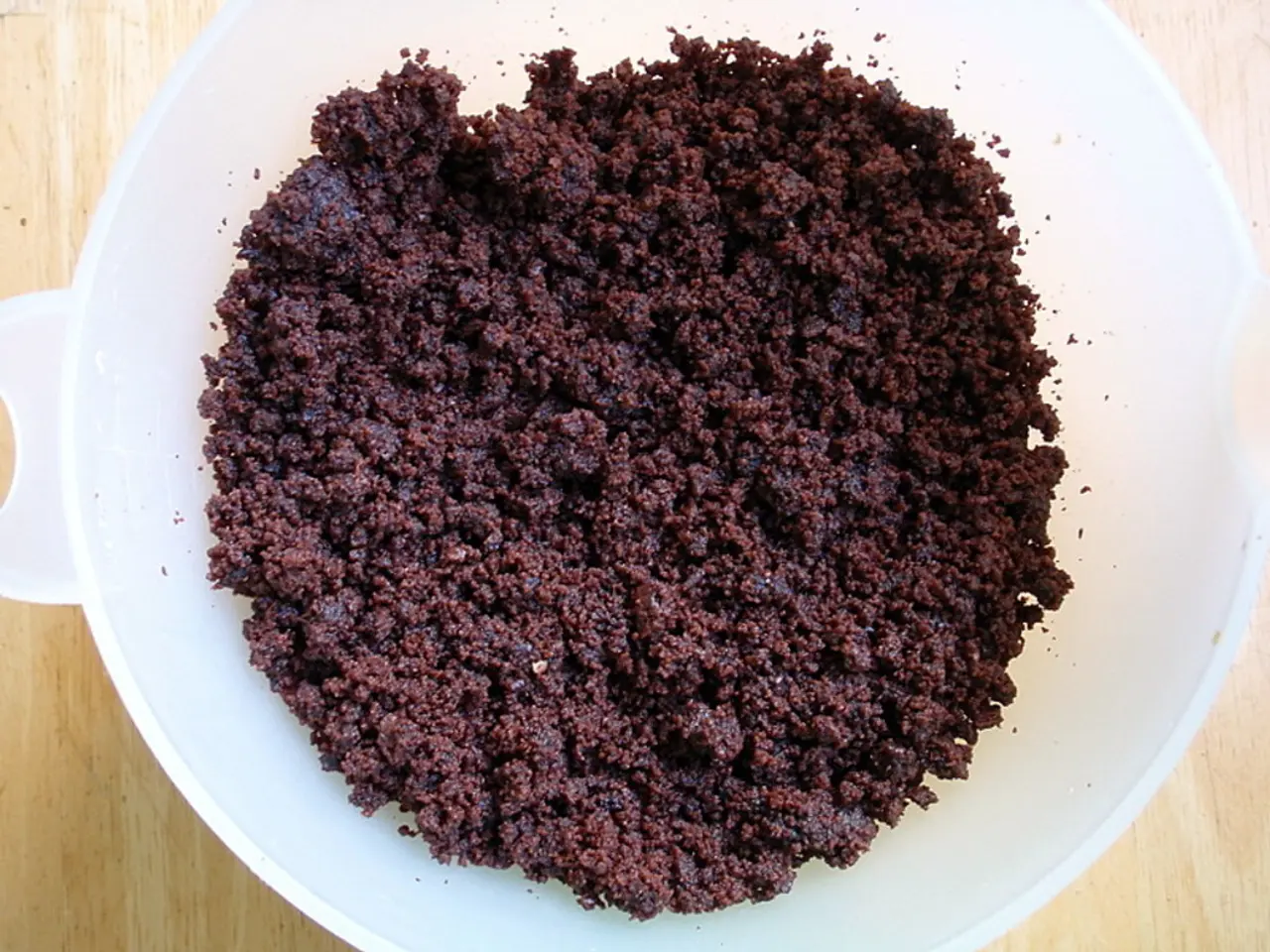Dietary Shortcomings and Crohn's Disease: A Comprehensive Overview
In Crohn's disease, inflammation and damage in the small intestine can lead to nutrient deficiencies, particularly in vitamins and minerals such as iron, calcium, vitamin D, zinc, and magnesium [1][3][4]. This article aims to provide a comprehensive guide on the common nutrient deficiencies in Crohn's disease, their symptoms, and the importance of nutritional supplementation and diet management.
Iron deficiency is a common occurrence in Crohn's disease due to internal bleeding, inflammation, and poor absorption. Symptoms include fatigue, weakness, pallor, and shortness of breath (anemia) [1]. Calcium and magnesium deficiencies are concerns as corticosteroids used in Crohn's increase the risk of osteoporosis. Deficiencies can lead to brittle bones, muscle cramps, and irregular heartbeat [3].
Vitamin B12 is absorbed in the terminal ileum, which is frequently affected or surgically removed in Crohn’s disease, leading to deficiency. Symptoms include anemia, fatigue, neuropathy, and cognitive disturbances [3][4]. Fat-soluble vitamins (A, D, E, and K) require fat absorption in the small intestine, which is impaired in Crohn’s. Deficiencies can cause poor bone health, weakened immune function, vision problems, skin healing issues, and muscle weakness [1].
Zinc deficiency can cause symptoms such as hair loss, eye and skin sores, loss of appetite, diarrhea, weight loss, problems with wound healing, inability to taste food, and low levels of alertness [1]. Malabsorption, difficulty digesting and absorbing nutrients, is a result of inflammation in Crohn's disease. Abdominal pain and nausea can reduce a person's appetite, leading to malnutrition [1].
Associated symptoms of these nutrient deficiencies include:
| Nutrient | Typical Symptoms | |----------------|----------------------------------------------------| | Vitamin B12 | Anemia, fatigue, numbness/tingling, memory issues | | Vitamin A | Vision problems, immune dysfunction | | Vitamin D | Bone pain, muscle weakness, increased infection risk| | Vitamin E | Muscle weakness, impaired skin healing | | Vitamin K | Increased bleeding tendency, poor bone health | | Iron | Fatigue, pallor, shortness of breath (anemia) | | Calcium | Bone pain, fractures, muscle cramps | | Magnesium | Muscle cramps, weakness, irregular heartbeat |
Nutritional supplementation and careful diet management are key in Crohn's disease to prevent or correct these deficiencies and their symptoms [1][3][4]. Doctors often monitor nutrient blood levels and may recommend multivitamins including these key nutrients, specific vitamin B12 injections or oral supplements, and iron therapy based on individual needs [1][3].
In addition, the Crohn's & Colitis Foundation (CCF) recommends people with Crohn's disease to work with a doctor to identify a list of nutritious foods they can eat, including low fiber fruits, lean protein, refined grains, fully cooked, seedless, and skinless non-cruciferous vegetables, and protein shakes [2].
It is essential for individuals with Crohn's disease to maintain a balanced diet and consult with their healthcare provider to manage their nutrient deficiencies effectively.
References:
[1] Crohn's & Colitis Foundation. (n.d.). Nutrition in Inflammatory Bowel Disease. Retrieved from https://www.ccfa.org/resources/nutrition-in-inflammatory-bowel-disease
[2] Crohn's & Colitis Foundation. (n.d.). Diet and Nutrition. Retrieved from https://www.ccfa.org/resources/diet-nutrition
[3] Mayo Clinic. (2020). Crohn's disease. Retrieved from https://www.mayoclinic.org/diseases-conditions/crohns-disease/symptoms-causes/syc-20373581
[4] National Institute of Diabetes and Digestive and Kidney Diseases. (2019). What I Need To Know About Crohn's Disease and Ulcerative Colitis. Retrieved from https://www.niddk.nih.gov/health-information/digestive-diseases/crohns-disease/what-i-need-to-know-about-crohns-disease-and-ulcerative-colitis
- The small intestine damage in Crohn's disease can result in deficiencies of various micronutrients like iron and calcium.
- Iron deficiency in Crohn's disease is prevalent due to internal bleeding, inflammation, and poor absorption, leading to symptoms such as fatigue, weakness, pallor, and shortness of breath (anemia).
- Calcium deficiency, a concern in Crohn's, increases the risk of osteoporosis because corticosteroids used in its treatment cause brittle bones, muscle cramps, and irregular heartbeat.
- Malnutrition is a possible outcome when inflammation in Crohn's disease causes malabsorption and reduces appetite.
- Common nutrient deficiencies in Crohn's disease include vitamin B12, vitamin A, vitamin D, vitamin E, vitamin K, iron, calcium, and magnesium.
- Symptoms associated with these deficiencies may include anemia, fatigue, vision problems, immunity issues, bone pain, muscle weakness, and increased infection risk.
- Beyond supplementation and diet management, working with a doctor to identify nutritious foods like low fiber fruits, lean protein, refined grains, cooked vegetables, and protein shakes is essential for individuals with Crohn's disease.
- In some cases, doctors may also suggest specific vitamin B12 injections, oral supplements, or iron therapy based on individual needs.
- The science of understanding and treating Crohn's disease-related deficiencies and associated medical conditions like chronic-kidney-disease, type-2-diabetes, and other nutrition-related conditions is continually evolving.
- Therapies and treatments for Crohn's disease include Medicaid, fitness and exercise, mental health support, skin care, and various medical-condition management strategies.
- CBD, as a potential treatment option, is being researched for its potential effects on inflammation and related symptoms in Crohn's disease.
- Ensuring a balanced diet is at the core of effective nutrient deficiency management for persons affected by Crohn's disease, whereas consulting healthcare providers is crucial to receive appropriate and personalized treatment.
- Proper treatment, diet management, and nutritional supplementation help maintain one's health and wellness, overall fitness and exercise levels, mental health, and skin care in people with Crohn's disease.




